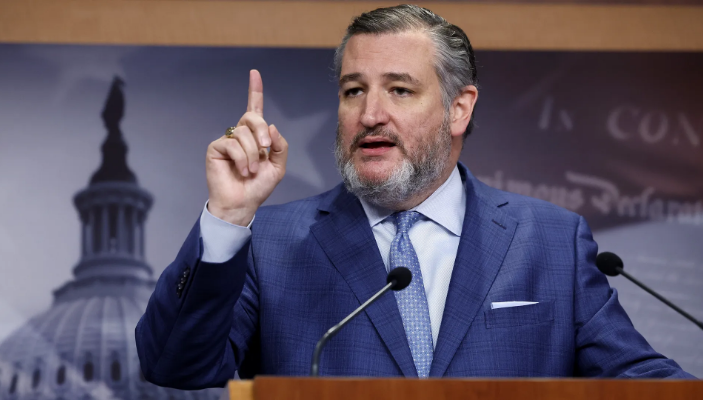Ted Cruz, the senior U.S. Senator from Texas, has remained a highly visible and vocal figure in American politics. Known for his conservative stances, frequent media appearances, and strong presence in the Republican party, Cruz has carved out a distinctive place in the national conversation. This article explores his background, political track record, legislative impact, and the factors that keep him at the center of ongoing debates—especially as the 2024 election cycle intensifies.
Early Life and Education
A First-Generation American with a Legal Mind
Born Rafael Edward Cruz in Calgary, Alberta, Canada in 1970, Cruz is the son of a Cuban immigrant father and an American mother. His heritage and upbringing have long shaped his views on immigration, personal responsibility, and opportunity.
Cruz earned his undergraduate degree from Princeton University and later graduated from Harvard Law School, where he was known for his sharp legal reasoning. He clerked for Chief Justice William Rehnquist and served as Texas Solicitor General before entering politics.
Rising Star in the Republican Party
2012 Senate Win
Ted Cruz first gained national attention in 2012 when he won a surprise victory in the Texas Senate race, defeating the Republican establishment’s favored candidate in the primary. Running on a platform aligned with the Tea Party movement, Cruz energized conservative voters with promises of limited government and strong constitutional values.
Notable Early Moves
Once in the Senate, Cruz quickly made headlines. He led a high-profile effort to defund the Affordable Care Act in 2013, resulting in a 16-day government shutdown. While this move drew criticism across party lines, it solidified his reputation among right-wing voters as a firm opponent of federal overreach.
Presidential Campaign and National Impact
2016 Republican Primary
Ted Cruz entered the 2016 presidential race as a key conservative contender. He was the last significant challenger to Donald Trump before suspending his campaign in May 2016. Though their rivalry was intense during the primaries, Cruz eventually became one of Trump’s strongest allies in the Senate.
Post-2016 Alignment
Despite earlier personal conflicts with Trump, Cruz aligned with much of the Trump administration’s agenda—supporting tax reform, judicial appointments, and stricter immigration policies. This move helped him consolidate his conservative base while still attracting Trump supporters.
Policy Positions and Legislative Work
Strong Conservative Values
Cruz’s voting record reflects firm conservative principles:
- Taxes: Advocates for low taxes and minimal regulation, supporting the 2017 Tax Cuts and Jobs Act.
- Gun Rights: A staunch supporter of the Second Amendment, opposing expanded background checks.
- Abortion: Strongly pro-life, voting in favor of defunding Planned Parenthood and promoting legislation that limits abortion access.
- Energy: As a Texan, he backs fossil fuel production and frequently criticizes federal regulations on the oil and gas industry.
- Immigration: Supports border wall funding, ending sanctuary cities, and stricter immigration laws.
Legal and Judicial Advocacy
Cruz has used his legal background to speak forcefully on constitutional matters. He frequently argues for originalist interpretations of the Constitution and has been active in supporting conservative judicial nominations at both federal and Supreme Court levels.
Controversies and Public Perception
Polarizing Figure
While his supporters admire him for consistency and intellectual rigor, critics often describe Cruz as overly partisan or opportunistic. His actions during the 2020 election certification process—objecting to the results in key states—drew national controversy and scrutiny.
The Texas Winter Storm Crisis
In 2021, Cruz faced backlash for leaving Texas during a historic winter storm that caused widespread power outages. His trip to Cancun, Mexico, became a media storm and resulted in public criticism, even from within his party. Though he returned and apologized, the incident affected public perception.
Current Focus and Future Plans
Key Senate Roles
Cruz serves on influential committees, including the Judiciary and Commerce committees. He continues to push conservative legislation, advocate for free speech on college campuses, and position himself as a leading voice in opposition to President Biden’s policies.
2024 and Beyond
While Cruz has not officially announced a 2024 presidential campaign, he remains a prominent figure in national Republican circles. He has hinted at potential ambitions but says he is currently focused on serving Texas. However, with the next Senate race in 2024 and his enduring influence, speculation remains high about his future trajectory.
Public Engagement and Media Presence
Social Media and Podcast
Cruz is one of the more digitally active senators. His podcast, Verdict with Ted Cruz, has grown a significant following and allows him to address political developments directly with supporters. His strong online presence helps shape public narratives and engage with conservative audiences beyond traditional media.
Conclusion
Ted Cruz’s role in American politics is defined by his unwavering conservative stance, legal sharpness, and tactical communication strategies. Whether viewed as a constitutional champion or a polarizing figure, Cruz remains an essential name in national political discussions, especially as the U.S. enters a critical election period. His influence in shaping Republican policy—and possibly its future leadership—will continue to draw attention in the coming years.
FAQs
1. What is Ted Cruz’s full name and background?
Ted Cruz’s full name is Rafael Edward Cruz. He was born in Canada to a Cuban father and American mother and later moved to Texas.
2. Did Ted Cruz run for president?
Yes, he ran in the 2016 Republican primary and was the last major opponent to Donald Trump before suspending his campaign.
3. What are Ted Cruz’s core political beliefs?
Cruz is known for strong conservative values including limited government, strict immigration laws, pro-life positions, and support for the Second Amendment.
4. Why was Ted Cruz criticized during the Texas winter storm?
He traveled to Cancun during a 2021 winter storm that left many Texans without power and water. The trip drew widespread criticism and led to a public apology.
5. Is Ted Cruz running in the 2024 elections?
As of now, he has not announced a presidential run but is up for re-election in the Senate. He remains active in national politics and Republican strategy.




